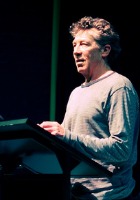(pinkham) Poem by Ken Bolton
(pinkham)
For Gregory O'Brien
I wonder how
Gregory does this
these three line
stanzas & whether I
can do them —
to any good effect.
I make coffee, check
various things around
the kitchen — find
the new clock
I got Gabe for his
birthday, note the
milk is almost
gone, bring the tea back
& sit at this finely red-&-
white checked table cloth
again, pick some rice off it
from the meal tonight
chew it, & start — which means,
mostly, I stop here
& see how I’ve done
It has my characteristic choppy
rhythms, etcetera. Oh well.
It is called after
Albert Pinkham Ryder
— Gregory’s poem —
“called after” an American
phrase, that I guess
comes to mind
as I recall
what little I know
of the American artist —
19th century? or
very early 20th?
I visualize small
emblematic paintings
typically
with a dark image
centered — briefly
silhouetted —
against a dark background —
a sort of horse-&-rider
against a storm? (The image
my mind remembers
may even be
some late sketch by Moreau
— you know: the late,
atypical unfinished
heavily impasto
fragments that
art historians love to suggest
the Fauves might have seen —
miles from the
stillness, & detail,
of Oedipus & the Sphinx
say — or “in most ways”
Anyway this is miles
from Ryder. And I am
briefly sure
it is Ryder I can imagine
& the Moreau too — his
horse & rider
in reds & blues
lemon yellow, the American’s
black & deeply
varnished colours — browns —
against a discoloured
white, or cream
& a larger dark ground.
Tho who knows?
Ryder
is not really our business
a reverberation of US
culture: local news
like CNN, the
American breakfast program
we get at night. What a
hopeless analogy. Ryder is better.
Moreau —
well, I like to bear in mind
his presence
along with Manet &
that revolution. Tho
give me Manet
any day, if I had
to choose. Tho, um, you don’t.
I like the portrait
— full face, almost filling
the frame — of Moreau
in a bowler hat
high collar, & tie, narrow
moustache — very
1900s modern
by Roualt (pupil
& friend) that is
slightly ‘cubist’:
the one eye furthest from us
— it is three-quarter on — & that
whole plane, of cheek
& wide wide forehead,
swells out, flattens,
just slightly.
It seems an irony
of history —
or perhaps the irony
was Roualt’s. It was
mine too eventually
(though less originally)
when I did a copy
of it . . .
that I liked
& seem to have lost now
Misplaced. I haven’t seen it
for a while
(I could do it
again.) I take the rest
of the tea
& toss it on the
pot-plant, beneath the goldfish.
The plant had dried out.
The fish wake slightly
& begin to move —
at this angle
a few vague red shapes,
a diaphanous white,
in a tank that looks
dark
This poem has not been translated into any other language yet.
I would like to translate this poem